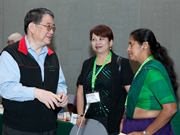4th UNI Apro Post & Logistics Conference

The 4th UNI Apro Post & Logistics Conference held in Bangkok 31 August 2013 saw a turn up of 31 delegates (2 women), 18 observers (6 women) and 43 guests from 22 trade unions across 16 countries.
The session was opened by Wilart Karnsasom, President of SEWU-THP and was followed by UNI Apro Regional Secretary Christopher Ng who encouraged unions to contribute to UNI Apro’s P&L activities. Christopher highlighted the positive impact of JPGU’s contribution. Congratulating UNI Apro P&L on its progress, DeMattheo, Head of UNI P&L thanked Usuki Hiroshi for his good leadership.
Also at the opening, Somchai, APPU Director said that it was important for delegates to achieve a common understanding. Usuki Hiroshi agreed, asking delegates to form friendships and to exchange ideas for future trade union activities. “USO is important and we need to create a new morale of labor,” said Hiroshi.
On top of the UN I Apro report of activities and proposals which were adopted, special reports for Fiji, Myanmar and Australia were also presented where delegates learnt about the political oppression against trade unions in Fiji, the lack of unions in Myanmar Post as a result of misunderstandings, and the internal conflict in CWU which has affected its affiliation with UNI.
A new work plan for UNI Apro Post & Logistics was adopted and elections for the UNI Apro Post and Logistics committee will now see Bro. Omata as the new President and Bro. Lee is his Deputy. Passing on the torch, Bro. Usuki said that UNI Apro P&L will face tremendous challenges for another 4 years, “your task is to protect universal service and social characteristics of postal service. It is your main task.”
Participants engaged in serious discussions about the condition of postal trade unions using different mediums and angles. These include two panel discussions, a paper analysis by Shailendra, and a general discussion from the floor which evoked the participation from many delegates.



Postal services in the new economy
Giving a keynote address on his paper “Postal services in the new economy,” Bro. Shailendra said that postal services of today “have to achieve modernization and diversification, using usefulness, trustworthiness, and innovative services of post.” He added that these values will help to differentiate postal services from its competitors and urged postal service unions to grasp USO as a social responsibility tool.
FTA and Challenge of postal workers
Bro. Kurihara, Project coordinator of UNI, explained and warned how FTAs can be a bad influence to postal services. He urged trade unions to “unite ourselves to challenge against malpractice of FTA.”
IPO and the challenge of postal workers
An increasing number of post offices are being privatised and delegates discussed its impact in the panel discussion titled “IPO (initial Public Offering) and the challenge of postal workers” where Bro. Usuki served the role of moderator.
Speaking about Malaysia Post, Bro. Effendy (UPCW) said that IPO had not threaten jobs in Malaysia Post. “The number of jobs has increased. However the decreased mail volume and increase in personnel costs has led Malaysian Post to seek franchising in order to cut costs.”
Bro. Thuvinder (UTES) said that IPO gives Singapore Post a possibility to provide new products and services to customers. “Postal workers must adopt the new environment.” However, he stressed the importance of seminars, where workers can be trained to provide new services.
Bro. Ishikawa (JPGU) also agreed that IPO can increase business freedom and ease investment opportunity in order to increase sustainability of postal services. He said that JPGU consults Japan Post in order to improve services and working conditions.
For Indonesia Post whose IPO plans were postponed, SPPI fears that service standards for post in Indonesia would decline if its postal service was privatized.
Bro. Lee Hang Gu (KPWU) said that KPWU has always opposed privatisation. Although corporatization was discussed in 2000, mass meetings and demonstrations organized by KPWU had stopped the move. Nevertheless, talks for corporatizing have come up many times since 2008 and KPWU will continue to oppose the move.
Breaking through! The organizational challenge of post and logistics workers
On the second panel discussion moderated by Theagarajan of FNPO, the challenges in organising post and logistics workers were discussed.
Bro.Trinh (VNUPTW) said that trade unions must first fulfil their role to protect workers’ rights and employment, provide seminars and support to workers, especially if they are injured or sick. “VNUPTW pays attention to improve postal services and is able to provide financial assistance to surplus workers as a result of positive negotiations with the government.”
Bro.Tenguh from Linfox Indonesia stressed the importance of partnership industrial relations and thanked SEKO and JPGU for their assistance. “Social dialogue is a key element and unions need to stand up for decent work,” said Tenguh.
Adding that collective bargaining is also important, Bro.Cheng (CPWU)Taiwan also stressed the need to nurture new young leaders as they will maintain the organization and protect the rights of workers.
This was chorused by Bro. Theagarajan who said that FNPO provides trainings which include youth and women activists. “India Post’s new management has plans to change India Post, we are prepared and our activities will keep FNPO moving ahead,” said Theagarajan.
Floor Discussion
The floor discussion generated reports from unions on their activities. Kun Wardana Abyoto shared DHL Indonesia’s victory in organizing new members past the 50% mark. “The DHL Indonesian management tried to deny the union from its collective bargaining rights but this was overturned when the union demanded a recount of their membership,” said Kun.
On NZ Post’s proposal to decrease working days, Bro. George Collins (EPMU) said that EPMU is actively against the management’s idea which will reduce the number of delivery days from five to three.
Addressing the issue on gender balance, Sis Soma(FNPO) and Sis. Chandrika (NPWU) both reported on increasing women representations in their unions. Soma said that the union is working to address problems that women face at work.


